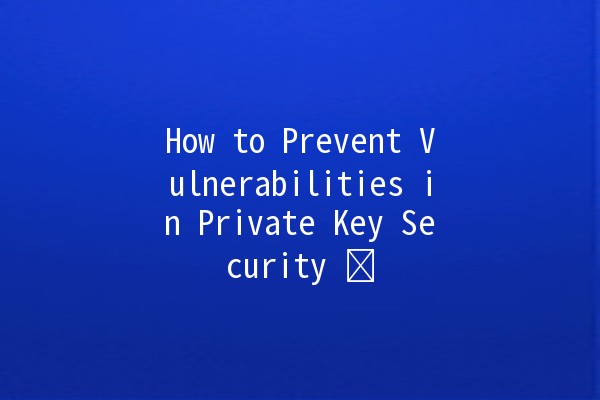
In an era where cryptocurrencies and digital assets are increasingly becoming part of our daily lives, the security of private keys has become a paramount concern. Private keys serve as the gatekeepers of our digital wealth. Losing control over these keys can result in irreversible losses, making it essential for users and organizations to adopt strict security measures. This article will discuss practical strategies to avoid vulnerabilities in private key security and provide readers with actionable tips to enhance their digital asset protection.
Understanding Private Keys
Before delving into the prevention strategies, it’s crucial to understand what a private key is. A private key is a unique cryptographic code that allows the owner to access and manage their digital assets on the blockchain. If someone obtains your private key, they effectively gain full control over your wallet and assets. Therefore, safeguarding private keys is not just a best practice; it is a necessity.
Implementing Effective Security Measures

Explanation: Hardware wallets are physical devices designed to store private keys offline. By keeping keys in a hardware wallet, users substantially reduce the risk of online hacks.
Application: To use a hardware wallet, purchase a reputable device such as Ledger or Trezor. During the setup, generate a new wallet and follow the instructions carefully to ensure that your private keys are stored securely on the device. This way, even if your computer gets compromised, your keys will remain safe.
Explanation: Twofactor authentication provides an additional layer of security by requiring not only a password but also a second form of verification. This could be through a mobile app or a hardware token.
Application: When setting up your cryptocurrency exchange or wallet services, always enable 2FA. Use tools like Google Authenticator or Authy, which generate temporary codes that are difficult to replicate. Even if someone obtains your password, they’ll need the second authentication method to access your account.
Explanation: Regularly updating your software ensures that you’re protected against newly discovered vulnerabilities. Software updates often include security patches that fix vulnerabilities.
Application: Set automatic updates on your operating system and applications related to cryptocurrency management. Always download software from the official website or a reputable source. Before updating your wallet software or firmware on hardware wallets, check the release notes to understand what vulnerabilities are being addressed.
Explanation: A multisignature wallet requires multiple signatures to authorize a transaction, which adds an extra level of security. This is particularly beneficial for organizations or partnerships.
Application: When creating a multisignature wallet, you can configure it to require signatures from multiple team members before funds can be moved. For example, a 2of3 multisig wallet means that out of three designated signers, at least two must approve a transaction, thereby reducing the risk of unauthorized access.
Explanation: Regular security audits assess current security practices and identify potential vulnerabilities in your digital strategy. This proactive approach helps in keeping your digital assets secure.
Application: Schedule a security audit every three to six months. This can include reviewing access to private keys, checking for software vulnerabilities, and ensuring that your backup procedures are effective. Consider hiring a professional security firm to perform an indepth assessment.
Additional Best Practices for Private Key Security
Backup Your Private Keys: Create multiple secure backups of your keys, using encrypted USB drives or secure cloud services. Ensure that the backups are stored in multiple locations.
Avoid Phishing Attacks: Be vigilant about phishing scams designed to steal your personal information. Always verify the authenticity of links and emails before entering sensitive information.
Educate Yourself and Your Team: Knowledge is power. Regularly educate yourself and your team about best practices for private key security and the latest threats.
Limit Access: Keep access to private keys restricted to only those who absolutely need it. The fewer people who have access, the lower the risk of exposure.
Common Questions About Private Key Security
Losing your private key means losing access to your digital assets. There are no ways to recover assets once a private key is lost unless you have a backup or recovery phrase stored securely. This is why it is crucial to have a reliable backup strategy in place.
Signs of compromise could include unauthorized transactions, changes in wallet balances that you did not initiate, or receiving alerts about unusual activity. If you suspect that your private key has been compromised, it’s essential to move your assets to a new wallet with a new private key immediately.
Online wallets can be less secure compared to hardware or paper wallets. If you must use an online wallet, ensure it offers strong security features such as 2FA and encryption. However, for longterm storage, consider using offline solutions.
Using an unsecured public WiFi network can put your private keys at risk of interception by hackers. Always utilize a secure, private network and consider using a Virtual Private Network (VPN) for added security.
While it is possible to store private keys on your computer, it is not advisable without additional security measures. Ensure that your computer has uptodate antivirus software and is protected by a strong password. Even then, consider using a hardware wallet for maximum security.
If you suspect malware on your computer, immediately disconnect it from the internet. Run a full antivirus scan and remove any detected threats. After ensuring your system is clean, consider transferring your assets to a new wallet to eliminate any lingering risks.
By diligently following these strategies and tips, you can significantly enhance your private key security, lowering the risk of vulnerabilities and protecting your digital assets effectively. Remember that security is an ongoing process that requires regular updates and vigilance to adapt to the evolving landscape of cyber threats. Stay informed, stay secure!

